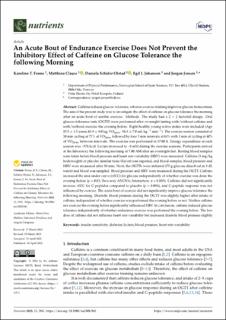| dc.contributor.author | Fenne, Karoline Tusvik | |
| dc.contributor.author | Clauss, Matthieu | |
| dc.contributor.author | Olstad, Daniela Schäfer | |
| dc.contributor.author | Johansen, Egil Ivar | |
| dc.contributor.author | Jensen, Jørgen | |
| dc.date.accessioned | 2023-10-17T08:06:03Z | |
| dc.date.available | 2023-10-17T08:06:03Z | |
| dc.date.created | 2023-05-05T15:22:33Z | |
| dc.date.issued | 2023 | |
| dc.identifier.citation | Nutrients. 2023, 15(8), Artikkel 1941. | en_US |
| dc.identifier.issn | 2072-6643 | |
| dc.identifier.uri | https://hdl.handle.net/11250/3096878 | |
| dc.description | This article is an open access article distributed under the terms and conditions of the Creative Commons Attribution (CC BY) license (https://creativecommons.org/licenses/by/4.0/). | en_US |
| dc.description.abstract | Caffeine reduces glucose tolerance, whereas exercise training improves glucose homeostasis. The aim of the present study was to investigate the effect of caffeine on glucose tolerance the morning after an acute bout of aerobic exercise. Methods: The study had a 2 × 2 factorial design. Oral glucose tolerance tests (OGTT) were performed after overnight fasting with/without caffeine and with/without exercise the evening before. Eight healthy young active males were included (Age 25.5 ± 1.5 years; 83.9 ± 9.0 kg; VO2max: 54.3 ± 7.0 mL·kg−1·min−1). The exercise session consisted of 30 min cycling at 71% of VO2max followed by four 5 min intervals at 84% with 3 min of cycling at 40% of VO2max between intervals. The exercise was performed at 17:00 h. Energy expenditure at each session was ~976 kcal. Lactate increased to ~8 mM during the exercise sessions. Participants arrived at the laboratory the following morning at 7.00 AM after an overnight fast. Resting blood samples were taken before blood pressure and heart rate variability (HRV) were measured. Caffeine (3 mg/kg bodyweight) or placebo (similar taste/flavor) was ingested, and blood samples, blood pressure and HRV were measured after 30 min. Next, the OGTTs were initiated (75 g glucose dissolved in 3 dL water) and blood was sampled. Blood pressure and HRV were measured during the OGTT. Caffeine increased the area under curve (AUC) for glucose independently of whether exercise was done the evening before (p = 0.03; Two-way ANOVA; Interaction: p = 0.835). Caffeine did not significantly increase AUC for C-peptides compared to placebo (p = 0.096), and C-peptide response was not influenced by exercise. The acute bout of exercise did not significantly improve glucose tolerance the following morning. Diastolic blood pressure during the OGTT was slightly higher after intake of caffeine, independent of whether exercise was performed the evening before or not. Neither caffeine nor exercise the evening before significantly influenced HRV. In conclusion, caffeine reduced glucose tolerance independently of whether endurance exercise was performed the evening before. The low dose of caffeine did not influence heart rate variability but increased diastolic blood pressure slightly. | en_US |
| dc.language.iso | eng | en_US |
| dc.subject | blood pressure | en_US |
| dc.subject | diabetes | en_US |
| dc.subject | heart rate variability | en_US |
| dc.subject | insulin sensitivity | en_US |
| dc.subject | lactate | en_US |
| dc.title | An acute bout of endurance exercise does not prevent the inhibitory effect of caffeine on glucose tolerance the following morning | en_US |
| dc.type | Peer reviewed | en_US |
| dc.type | Journal article | en_US |
| dc.description.version | publishedVersion | en_US |
| dc.rights.holder | © 2023 by the authors | en_US |
| dc.source.pagenumber | 14 | en_US |
| dc.source.volume | 15 | en_US |
| dc.source.journal | Nutrients | en_US |
| dc.source.issue | 8 | en_US |
| dc.identifier.doi | 10.3390/nu15081941 | |
| dc.identifier.cristin | 2145881 | |
| dc.description.localcode | Institutt for fysisk prestasjonsevne / Department of Physical Performance | en_US |
| dc.source.articlenumber | 1941 | en_US |
| cristin.ispublished | true | |
| cristin.fulltext | original | |
| cristin.qualitycode | 1 | |
